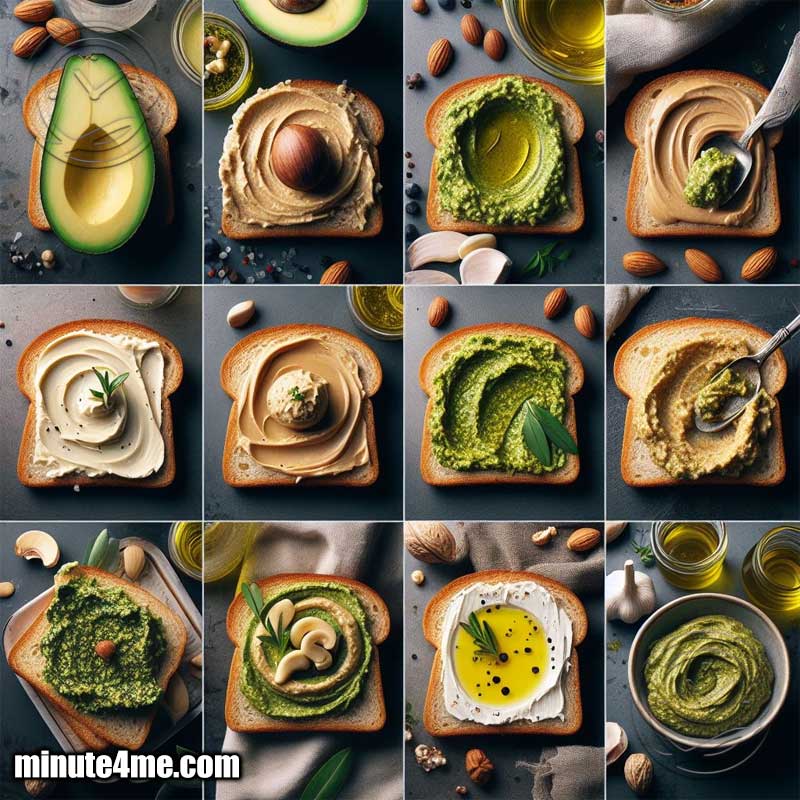Introduction to Mediterranean Diet
The Mediterranean diet is celebrated worldwide for its numerous health benefits, primarily its emphasis on consuming healthy fats over saturated fats found in products like butter.
This diet pattern, rich in fruits, vegetables, whole grains, and lean proteins, particularly highlights the importance of using oils rich in monounsaturated fats.
Let’s delve into why substituting butter is beneficial and explore the best alternatives that align with Mediterranean dietary principles.
Why Substitute Butter?
The Mediterranean diet underscores the importance of minimizing saturated fats, such as those found in butter, to foster a healthier eating pattern.
Butter, while a staple in many traditional diets, contains high levels of saturated fat and cholesterol, which are linked to an increased risk of heart disease and stroke.
The rationale behind substituting butter stems from a comprehensive approach to improve overall health by enhancing the quality of fats in the diet.
This shift not only aligns with the Mediterranean diet’s principles but also supports modern dietary guidelines that recommend limiting saturated fat intake to reduce the risk of chronic diseases.
Key reasons to consider substituting butter:
- Reduce Saturated Fat Intake: Lowering the amount of saturated fats consumed daily can significantly decrease the risk of heart disease.
- Enhance Heart Health: Substituting butter with oils rich in monounsaturated and polyunsaturated fats can improve heart health markers, including lowering LDL (bad) cholesterol levels.
- Promote Healthy Weight Management: Healthier fats have a different effect on the body compared to saturated fats, potentially aiding in weight management.
Mediterranean Diet Dinner Options
Discover the Mediterranean Diet dinner options – a heart-healthy lifestyle, not just a diet. Dive into a world of delicious…
Health Benefits
The health benefits of reducing butter intake and opting for healthier fat alternatives are extensive and supported by numerous studies.
Transitioning towards fats that are predominant in the Mediterranean diet can lead to significant improvements in cardiovascular health, alongside other metabolic benefits.
Major health benefits include:
- Improved Heart Health: Decreasing saturated fat intake lowers LDL cholesterol, reducing the risk of heart disease and stroke.
- Better Blood Sugar Control: Diets high in monounsaturated and polyunsaturated fats can help improve insulin sensitivity, which is beneficial for managing and preventing type 2 diabetes.
- Enhanced Nutrient Intake: Many butter substitutes, such as olive and avocado oil, are rich in essential nutrients, including vitamin E and antioxidants.
Top Butter Substitutes in Mediterranean Cooking
In Mediterranean cuisine, several butter substitutes not only offer health benefits but also enrich dishes with distinct flavors and textures.
These alternatives are versatile, aligning with the diet’s focus on plant-based foods and healthy fats.
Top substitutes include:
- Olive Oil
- Avocado Oil
- Ghee
- Coconut Oil
Each of these substitutes brings its unique profile of benefits, making them suitable for different types of cooking and baking.
Mediterranean Diet Wine Pairings
Discover the tantalizing world of Mediterranean wine pairings! Dive into the health benefits of the Mediterranean diet, known for reducing…
1. Olive Oil
Olive oil is perhaps the most celebrated fat in the Mediterranean diet, prized for its health benefits and culinary versatility.
It is a rich source of monounsaturated fats and antioxidants, which contribute to its heart-healthy attributes.
Key aspects of olive oil:
- Nutritional Profile: High in monounsaturated fats and low in saturated fat, olive oil is beneficial for heart health.
- Antioxidant-Rich: Contains antioxidants like polyphenols, which reduce inflammation and may lower the risk of chronic diseases.
- Versatility in Cooking: Ideal for dressing, sautéing, and even baking, olive oil adds a distinct flavor to dishes.
Olive Oil in Mediterranean Recipes:
- Salads: Used as a base for dressings.
- Cooking: Excellent for sautéing vegetables and meats.
- Baking: Can replace butter in certain recipes, offering a lighter texture and unique flavor.
2. Avocado Oil
Avocado oil, much like olive oil, is lauded for its health benefits, particularly its heart-healthy monounsaturated fats.
Its mild flavor and high smoke point make it an excellent choice for a variety of cooking methods.
Advantages of Avocado Oil:
- Heart Health: High in monounsaturated fats, beneficial for lowering cholesterol.
- High Smoke Point: Suitable for high-heat cooking, such as frying and roasting.
- Neutral Flavor: Complements both sweet and savory dishes without overpowering them.
| Usage | Olive Oil | Avocado Oil |
|---|---|---|
| Dressing | Ideal for vinaigrettes and salad dressings. | Can be used but is less flavorful than olive oil. |
| Cooking | Perfect for sautéing and low-heat cooking. | Suitable for high-heat applications like frying. |
| Baking | Adds a fruity note to baked goods. | Provides a neutral taste, better for subtle flavors. |
Is Mediterranean Diet Plant-Based?
Discover the truth about the Mediterranean diet – a culinary journey around the Mediterranean Sea. Dive into the rich flavors…
3. Ghee
Ghee, a form of clarified butter, is deeply rooted in traditional Indian cuisine and has gained popularity within the Mediterranean diet for its nutritive value and versatile cooking applications.
Unlike regular butter, ghee is lactose-free and has a higher smoke point, making it suitable for a variety of cooking methods, including those requiring high temperatures.
Benefits and Uses of Ghee:
- Rich in Fat-Soluble Vitamins: Ghee is a good source of vitamins A, E, and D, which are essential for immune function, skin health, and bone density.
- High Smoke Point: With a smoke point of around 485°F (250°C), ghee is ideal for frying, sautéing, and other high-heat cooking techniques.
- Adds Depth to Flavors: Ghee imparts a nutty flavor that enhances the taste of various dishes, from savory meals to baked goods.
Practical Tips for Cooking with Ghee:
- Use ghee for stir-frying vegetables to bring out their natural flavors.
- Substitute ghee for butter in baking recipes for a richer taste and moist texture.
- Spread ghee on bread or mix it into rice for an added touch of richness.
4. Coconut Oil
Coconut oil is a versatile fat that can be used in both sweet and savory dishes, making it a valuable component of the Mediterranean diet, especially for those seeking plant-based alternatives.
It’s known for its ability to solidify at cooler temperatures, which is beneficial in recipes where a solid fat is preferable, such as in baking.
Health Benefits and Culinary Uses:
- Medium-Chain Triglycerides (MCTs): Coconut oil contains MCTs, which are metabolized differently than other fats, potentially aiding in weight management and energy levels.
- Baking and Cooking: Its solid state at room temperature makes coconut oil a great substitute for butter in baked goods, offering a slight coconut flavor.
- Vegan-Friendly: A plant-based alternative suitable for vegan diets, providing a butter-like texture in recipes.
Guidelines for Using Coconut Oil:
- In baking, coconut oil can be used as a 1:1 substitute for butter.
- For sautéing or frying, use coconut oil to add a hint of coconut flavor to dishes.
- Coconut oil can be used to grease pans and molds for a non-stick surface.
Incorporating Butter Substitutes into Your Diet
Adapting your diet to include healthier fats in place of butter is a step towards embracing the Mediterranean lifestyle.
This transition not only contributes to better health outcomes but also introduces a variety of flavors and textures to your meals.

Strategies for Incorporation:
- Start with Small Changes: Begin by replacing butter with olive oil in salad dressings or for drizzling over vegetables.
- Experiment in Baking: Use coconut oil or ghee as a butter substitute in your favorite baking recipes to explore different tastes and textures.
- Explore New Flavors: Incorporate avocado oil in marinades or for high-heat cooking to add a subtle, nutty flavor to your dishes.
Recipes with Mediterranean Butter Substitutes
Incorporating these butter substitutes into your daily cooking can be both a nutritious and delicious venture.
Here are some recipe ideas:
- Olive Oil Lemon Cake: A light, flavorful cake that uses olive oil for moisture and a unique taste.
- Ghee Roasted Chickpeas: A crunchy, protein-rich snack seasoned and roasted in ghee.
- Avocado Oil Vinaigrette: A simple, healthy dressing for salads, showcasing the mild taste of avocado oil.
- Coconut Oil Chocolate Chip Cookies: A vegan-friendly treat where coconut oil provides the perfect texture and a hint of coconut flavor.
Understanding Fats in the Mediterranean Diet
The Mediterranean diet emphasizes the importance of incorporating healthy fats into your diet, moving away from saturated fats like butter to more heart-healthy alternatives.
Understanding the nutritional profile and health benefits of these substitutes is key to making informed dietary choices.
Key Points on Healthy Fats:
- Monounsaturated Fats (MUFAs): Found in olive and avocado oils, MUFAs are known for their heart-healthy properties, including reducing bad cholesterol levels.
- Polyunsaturated Fats (PUFAs): Essential fats that the body can’t produce on its own, found in nuts, seeds, and fish, contributing to brain health and inflammation reduction.
- Saturated Fats: While not inherently harmful in moderation, reducing saturated fat intake by substituting with MUFAs and PUFAs can lead to better health outcomes.
Conclusion
Adopting the Mediterranean diet’s approach to fats by substituting butter with healthier alternatives is a beneficial change.
This switch not only aligns with the diet’s emphasis on monounsaturated fats but also introduces new flavors and textures to your cooking repertoire.
By experimenting with these substitutes, you’re taking a step towards a heart-healthier lifestyle without sacrificing taste or enjoyment in your meals.







